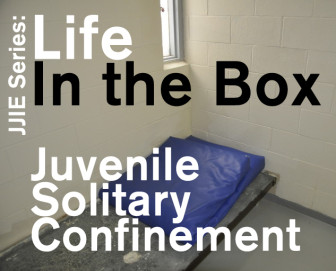Nothing in attorney Sandra Simkins’ 15-year career could prepare her for the sight of Troy D.
“In all the time I’ve been doing this work, I have never seen anything like this,” Simkins told JJIE. “This kid did not have clothes. He was wrapped up in this weird yoga mat thing with Velcro straps. He had severe self-mutilation up and down his arms and all over his body. And he was even handcuffed within his cell, and I asked him what was going on, and he said he had been quote ‘in the box’ for about six months. And that was my first introduction into solitary.”
Simkins first encountered Troy when he was 16, in September 2009, as his counsel as part of a 3 ½-year grant from the John D. and Catherine T. MacArthur Foundation to provide post-disposition representation for juveniles in New Jersey, where such representation had been non-existent.
 She referred the cases of Troy, then held in the Juvenile Medium Security Facility (JMSF) in Bordentown, N.J., and another juvenile held in solitary confinement in the state, O’Neill S., to the non-profit, Philadelphia-based Juvenile Law Center. The JLC, with pro bono co-counsel Dechert LLP (of Philadelphia), filed a federal lawsuit on behalf of the two boys, which led to a $400,000 settlement last November.
She referred the cases of Troy, then held in the Juvenile Medium Security Facility (JMSF) in Bordentown, N.J., and another juvenile held in solitary confinement in the state, O’Neill S., to the non-profit, Philadelphia-based Juvenile Law Center. The JLC, with pro bono co-counsel Dechert LLP (of Philadelphia), filed a federal lawsuit on behalf of the two boys, which led to a $400,000 settlement last November.
O’Neill died at 19 in a Philadelphia shooting in January 2012.
Court documents and interviews with attorneys who represented Troy and O’Neill provide a harrowing look at extended solitary confinement of juveniles in New Jersey juvenile detention facilities.
The lawsuit and its settlement, along with a July petition by the New Jersey American Civil Liberties Union and other organizations calling for a ban on punitive solitary confinement in New Jersey, have placed the state in the spotlight in a national debate over juvenile solitary confinement.
Critics say the practice amounts to torture and can cause irreparable psychological and developmental harm to youths, thousands of whom are held in solitary in juvenile facilities across the nation each year.
Troy, according to the lawsuit, spent at least 178 days in solitary between February 2009 and October 2010, locked in a concrete cell measuring about 7 feet by 7 feet. O’Neill spent 55 days in solitary on 14 separate occasions between June 2009 and October 2010 in the JMSF and the New Jersey Training School in Monroe Township, N.J.
Each solitary cell had a concrete slab bed, a toilet and a sink, and meals were slid under the door. The youths were allowed out only to shower and had no access to education, physical recreation, peers or personal possessions.
Troy, who had a history of suicide attempts and mental illness, including auditory and visual hallucinations, was placed in solitary under “special-observation status” requiring close or constant watch, purportedly for his own safety.
O’Neill, then 16, was adjudicated delinquent in February 2009 for conspiracy to distribute controlled dangerous substances and placed in a residential drug rehabilitation center. After escaping from the rehab, he was placed in JMSF before being transferred to the New Jersey Training School.
For at least 50 of his days in the box, court papers allege, O’Neill was being held while on “prehearing room restriction,” when juveniles are put in solitary before a disciplinary hearing. He was sent to solitary for offenses as minor as writing on the wall of his cell with a pencil, Simkins said. Other times, she said, he was sent to solitary after being assaulted.
Before post-disposition representation of Troy and O’Neill, Simkins had worked as assistant chief of the Juvenile Unit of the Philadelphia Defender Association, where she supervised more than 20 juvenile attorneys. Pennsylvania does not allow solitary confinement of juveniles.
“Coming from Pennsylvania, they don’t do isolation, they don’t have solitary, and it was astonishing to me that this was permitted for juveniles,” said Simkins, now director of the Children’s Justice Clinic at Rutgers School of Law – Camden.
In New Jersey, Simkins said, solitary confinement of juveniles has long been concealed.
“I don’t think the judges know what goes on in these facilities. There is very little oversight. Lawyers don’t visit. So it’s a very hidden problem,” she said.
“And they don’t call it solitary. They call it all those other words like prehearing room restriction or segregation or close watch. They have all of these names that don’t sound like solitary. And so you have to really, really study the problem and spend time understanding a facility to get a handle on what’s going on.”
The lawsuit, filed June 7, 2010, named as defendants officials with the New Jersey Juvenile Justice Commission, which oversees the state juvenile justice system; staffers at state juvenile detention facilities; and a psychiatrist and psychologists from the University of Medicine & Dentistry of New Jersey (now part of Rutgers) who were responsible for evaluating and treating Troy.
In court papers, the plaintiffs’ attorneys said, “Defendants’ excessive confinement of Troy and O’Neill and the inhumane conditions of confinement imposed on them were arbitrary, improper, shock the conscience, offend notions of fairness, are offensive to human dignity, and constitute cruel and unusual punishment.”
The suit charged the defendants violated the plaintiffs’ 14th Amendment and New Jersey constitutional rights to due process as well New Jersey state law.

The front gate leading to the New Jersey Training School" credit="
Troy — who was adjudicated delinquent for violation of probation, fourth-degree criminal sexual contact, third-degree aggravated assault, third-degree criminal restraint and two counts of fourth-degree aggravated assault — had repeatedly requested that he receive counseling and that he be removed from solitary confinement, court papers alleged.
Troy, plaintiffs alleged, did not even receive much of his twice-weekly, court-mandated sex-offense treatment, having had only six sex-offense sessions and nine other purported individual therapy sessions during his 178 days in solitary.
This, despite the fact that he had repeatedly mutilated himself with pieces of caulk or tile, banged his head against a wall, urinated in his cell and smeared feces on the walls.
“While there may be several acceptable ways to treat a juvenile who is suicidal, hallucinating, and self-mutilating, none of them include isolation for 178 days,” an amended complaint to the lawsuit stated.
Troy was subjected to especially harsh conditions, even for solitary confinement, the suit alleged.
He complained of extreme cold, and the mattress pad as well as sheets were often removed from the concrete slab bed. For at least 120 days, court documents said, Troy was ordered to remove his clothes and wear a “Ferguson gown,” a bulky, heavy, sleeveless smock. He allegedly told staffers on multiple occasions that showering while he was provided only with the smock subjected him to more cold. “He was routinely punished with extended isolation for refusing to take a shower,” court papers say.
In response to his cries for help, court documents say, juvenile facility staffers extended his isolation and restrained him or used force against him repeatedly, sometimes causing injuries.
“He was caught in a Catch-22 where if he asked for help he was told that he would remain in for a longer period of time,” Jessica Feierman, supervising attorney with the Juvenile Law Center, told JJIE. “Essentially, he had to prove he was better to get out of isolation.”
The lawsuit noted New Jersey’s Juvenile Code promises the state will “provide for the care, protection and wholesome mental and physical development of juveniles coming within the provisions of this act.”
With the lawsuit still pending, the New Jersey ACLU joined a broad coalition of advocacy groups in July in submitting the petition urging the Juvenile Justice Commission to end its use of solitary confinement as a disciplinary measure for children.
In a July 15 letter to JJC Executive Director Kevin M. Brown, the petitioners stated: “There is an emerging body of social scientific literature that concludes that the negative effects of solitary confinement are devastating and that the effects are particularly acute for young people.”
The JJC rejected the petition in mid-February.
In response to a JJIE request for comment, Sharon Lauchaire, the public information officer for the JJC, emailed a statement last week.
"There are a number of reasons why the JJC restricts juveniles to their rooms, including discipline,” the statement said. “Residents also may be put on room restriction status for medical reasons, for their own protection, or for the protection of others.”
In 2005, the statement said, the JJC “undertook an extensive process to limit its use of room restriction to 5 days.”
“Implementation of this new rule received strong support from a broad range of advocacy groups, and remains in large measure the correctional standard across the nation,” the statement continued.
The New Jersey administrative code stipulates that a juvenile may not be subjected to more than five days in solitary for a disciplinary violation; may not be put in solitary more than 10 days in any 30-day period; and must be given two consecutive days outside solitary following any five-day period in solitary.
But the code includes a huge loophole that allows for unlimited solitary: “Nothing in this section shall prevent the placement of a juvenile in room restriction for the minimum time necessary to eliminate an immediate threat to the safety of either the juvenile, staff or other juveniles, or to the orderly operation of the facility.”
In response to a JJIE query about this loophole, the commission said in a statement Wednesday: “Juvenile Justice Commission regulations provide for a narrow exception to the room restriction limit of five consecutive days, although it is rarely invoked. Under the exception, a juvenile may be placed in room restriction for the minimum time required to eliminate an immediate threat to the safety of either the juvenile, other juveniles, staff, or the orderly operation of a facility. This limited exception is common in institutional settings, and is necessary to ensure the safety and security of the facility, its staff and residents. JJC's policy and practice continues to be that juveniles should be held in room restriction for a minimal period of time. The majority of room restriction uses involve significantly less than five days, and the rarely applied exception is always accompanied by strong internal management controls."
The JJC said it “regularly monitors, reviews and adjusts its policies and practices, including its room restriction policy, to ensure that the Commission is using the best methodology to promote the education, advancement and rehabilitation of the juveniles for which it is responsible.” And the commission said it would continue talks with the ACLU and “other interested parties” to “discuss strategies for achieving our goal of ensuring the safety and welfare of the JJC's residents.”
Soon after the petition was filed with the JJC, a union representing correctional officers in New Jersey, PBA Local 105, launched a campaign opposing a ban on solitary confinement of juveniles. The union did not respond to calls from JJIE seeking comment.
In an Aug. 26 news release, PBA Local 105 said: “Five days room restriction is reserved for extreme negative and violent behavior. The hearing officer seldom hands out the maximum room restriction penalty. By removing room restriction, other inmates and staff are subject to harm by these violent juveniles.”
The news release quoted the union’s president, Lance Lopez Sr., as saying: “Advocacy groups also should not mischaracterize these inmates as children, giving the public the misconception that these inmates are grade school children. ... Most have the stature and strength of grown men and women. Many already have children of their own, are associated with gangs and unfortunately lost all innocence long before beginning their time in the system.”
In response to Lopez’s comment, the Juvenile Law Center’s Feierman noted research on adolescent development that has been widely accepted in the U.S. legal system demonstrates young people have the capacity to change and mature.
“It does a disservice to the youth in JJC care, as well as to the staff, to ignore the opportunities for positive growth and development that are core to our juvenile justice system, and clearly recognized in the Juvenile Justice Commission mission statement,” Feierman said in an email.
On the union’s concerns about safety of staff and juveniles, she said all staff and youth in juvenile facilities should feel safe, and she pointed to research on solitary confinement that shows it tends to increase, not decrease, anger and rage.
“New Jersey should look to other states that have banned juvenile solitary confinement to identify alternative approaches that work,” Feierman said.
And Simkins said “the box” is hardly reserved for the most violent offenders.
Of about 200 children in JJC custody whom she represented as part of the post-disposition counsel project, she said, roughly 120 spent time in solitary confinement.
“In New Jersey,” Simkins said, “solitary is used as the first go-to response. The regulations in New Jersey allow the box to be used for just about anything.”
Juveniles have been put in solitary for using profanity, disobeying an order or not getting in the right line or moving fast enough, she said.
Speaking of the JJC’s rejection of the petition, Simkins said: “I think the rejection of the petition speaks for itself. Their mandate is supposed to be rehabilitating kids, and solitary clearly harms kids.”
And Amy Fettig, senior staff counsel with the ACLU's National Prison Project, said the case of Troy and O’Neill “is a red flag that there’s some serious solitary confinement problems in the juvenile justice system in New Jersey.”
“It’s very disheartening that with that terrible record, New Jersey has still chosen not to solve its problem and step forward to protect children.”
DISCLOSURE: Past and current financial supporters of the Juvenile Justice Information Exchange may be quoted or mentioned in our stories. They may also be the subjects of our stories.

Pingback: Seven Days in Solitary [3/16/2014] - Solitary Watch